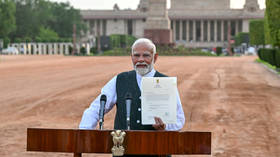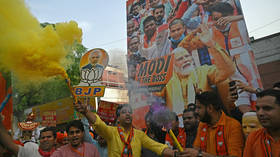India’s comeback: How Modi foiled the West’s grand plan
As Indian leader is set to swear-in as prime minister for the third time on Sunday, the world will continue looking up to New Delhi as the emerging global power, whose voice cannot be ignored
India’s Bharatiya Janata Party (BJP) led by Prime Minister Modi was expected to win a decisive majority in the recently-concluded national elections. All observers and exit polls predicted this.
When the results were announced earlier this week, however, it emerged that the BJP had failed to win a majority of its own. It will now form a coalition government with the support of regional parties as its allies as part of the National Democratic Alliance (NDA).
Undoubtedly, the election results have been a set back for Modi and the BJP. But it is unlikely that this will materially affect governance.
In his address at BJP headquarters after the election results were announced Modi made it clear that it will be ‘business as usual’ for him. His vision for India’s future remains unchanged. He will implement an agenda as per his commitments. This task will of course become more difficult – with a stronger political opposition at home.
However, as regards foreign policy, there will be continuity. BJP and its allies in the NDA bloc do not have differences on external affairs. The two principal coalition partners have a domestic policy focus.
As it is, foreign policy was not a subject of debate during the elections, barring some episodic attacks by the Congress opposition on the government’s China policy, which it claims downplays the extent of China’s border intrusions. The election manifestoes of various political parties contained little on issues of India’s foreign policy.
The BJP’s own election manifesto was perfunctory in this regard. It made no direct reference to the US or Russia. China was mentioned only in the context of accelerating the build up of infrastructure on the India-China border.
Issues such as collaboration with Indo-Pacific countries to focus on security and growth of all, continuation of the Neighbourhood First policy, support for Israel on the issue of terrorism, India’s aspiration for permanent membership of the UN Security Council all figured in the BJP manifesto’s bare-boned foreign policy content.
It also made note of substantial gains in the global spread of India’s soft power, such as the International Yoga Day and Ayurveda, as well as the return of stolen artefacts to the country. The growing study of Indian classical languages in educational institutions across the world was mentioned as a goal.
In his few remarks on foreign policy in the several media interviews he gave during his election campaign, Modi spoke of India as a “vishwabandhu”, that is, a friend of all countries. This would mean a continuation of the existing policy of of avoiding entanglement in third country conflicts, work in favour of diplomacy and dialogue, and be a force for peace.
It implies support for multilateralism, as that guarantees the promotion of collective interest through a constructive dialogue. It also implies preserving India’s independence in foreign policy making, otherwise described as “strategic autonomy”.
One can also broadly include in the “vishwabandhu” concept support for the priorities and concerns of the global south in international affairs. Cooperative multipolarity flows from this, as multipolarity is necessary to counter hegemony, to balance the interests of North and South, or East and West, and promote equal treatment of all members of the international community.
Since Modi assumed power in 2014, he has been a target of criticism by the media, think tanks, academic circles, democracy promotion and human rights organisations, and the so-called “progressive” civil society elements in the West. These attacks continued before and after Modi won the 2019 elections. Some sections of the western media and research organisations actually called for rejecting Modi electorally.
The intensity of these attacks increased prior to this year’s election. The New York Times, the Washington Post, the Economist, the Financial Times, Le Monde, Deutsche Welle, the Wall Street Journal, France 24, the BBC, the journal Foreign Affairs have led a manifestly orchestrated campaign against Modi’s re-election. Attacks have come from the US International Commission of Religious Freedoms, V-Dem of Sweden, the Open Society Foundation of George Soros, the Human Rights and Religious Freedom reports of the US State Department etc. Individual US Congressmen have joined the chorus too.
The substance of these attacks has been identical with that of the principal Indian opposition party’s criticism of Modi personally and of his government.
A new line of attack has been opened up, this time through intelligence leaks, accusing India of interfering in elections in Canada and New Delhi’s operatives of monitoring the activities of the Indian diaspora, in Australia for example, or even eliminating political dissidents abroad. The opposition in India has tried to leverage these claims to accuse the Modi government of bringing disrepute to the country, instead of exposing the political purpose behind these foreign attacks, which is to defame India.
Western countries are very sensitive to any perceived external interference in their elections and have imposed sanctions on countries thought to have interfered. But their agencies have been complicit in interfering in India’s politics and the electoral scene. This is a typical case of double standards.
How much the third Modi government will take note of this western (and suspected Chinese) interference in India’s internal and electoral affairs, including by resident western correspondents in India, remains to be seen.
Some in India’s security circles have long believed that the West would prefer a weakened Modi government in power, one without a majority of its own, as that would make India more vulnerable to pressure. In western think tank and media circles the desire to cut Modi to size has been apparent. The latest issue of the Economist emphasizing the humbling of Modi reflects this.
How much this strengthens the underlying distrust of the West in India or informs policy towards the West is not clear, but some effect it will have. At a minimum, the need to maintain a balance in our external ties, especially with regard to the importance of Russia, will be recognised even more, as also the advantages of our links with BRICS and the SCO as counters to western pressure and stepping stones towards a multipolar world. Of course, the difficult ties with China complicate India’s options in this regard.
Modi’s policy on the Ukraine conflict will remain unchanged. He will not personally attend the peace conference on Ukraine in Switzerland. On Gaza, India continues to support a two state solution and has voted accordingly in the UN General Assembly. India’s position on these two issues is guided by its national interest.
At the end of the day, the size of the electoral victory of a politician is of passing interest abroad. Foreign countries have to deal with those in power. Very few western politicians have decisive internal support. Their popular ratings are often low but that does not affect how the world deals with them.
If India’s economy, which grew by 8.2% in 2023 continues to expand, if economic reforms boost India’s attractiveness, if the country succeeds in developing its manufacturing sector, including in the defence area, and if the vital ‘youth dividend’ materialises as expected, India’s foreign policy options in the coming five years of Modi’s government will expand. The country will succeed in protecting its national interest and increase its influence in world affairs.
The statements, views and opinions expressed in this column are solely those of the author and do not necessarily represent those of RT.








Comments are closed.